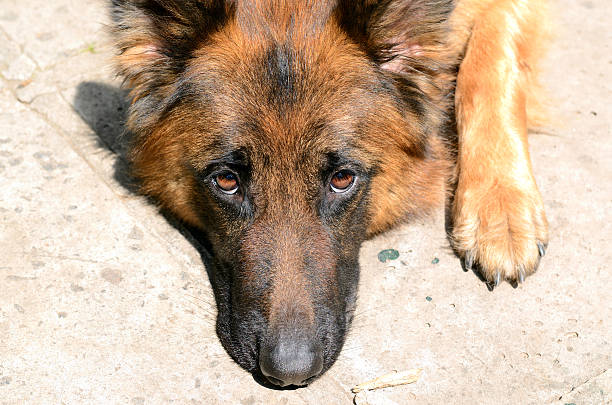Lifespan of a German Shepherd dog known for their dedication, sense, and work morale, is among the world’s most loved dog breeds. With a lifespan that can scope widely based on numerous factors, masters usually wonder, “How long will my German Shepherd be with me?”
In this article, we’ll dive deeply into the factors influencing their lifespan, how they are similar to other breeds, and how you can ensure your German Shepherd lives a long, glad life. German Shepherds can live anywhere from 9 to 13 years, with personal lifespan trust on various factors, including genetics, health care, culture, and surroundings. Let’s search these aspects in detail.
Genetics and Breed Characteristics
Genetics plays a necessary part in concluding the lifespan of a German Shepherd dog. As a breed, German Shepherds are given to specific health problems, such as hip dysplasia and regressive myelopathy, which can impact their longevity. Understanding their genetic predispositions helps owners make recommended health care and direction choices.
Breeders also play a role here; responsible breeders focus on reducing hereditary health chances by selectively breeding German Shepherds with a clean bill of health. If you’ve because adopted or bought a German Shepherd puppy, always look for reputable breeders who prioritize genetic health.
Importance of Diet and Nutrition
Losing weight is one of the highest essential factors in a dog’s overall health and lifespan. German Shepherds, being dynamic and muscular, require a high-quality diet that meets their power needs. food like protein, healthy fats, vitamins, and minerals donate to a stable immune system, which can fight off infections and slow down aging.
Avoiding fillers and preferring a diet rich in actual meat, vegetables, and grains (or grain-free if needed) ensures they get the nutrition they need. Consulting your veterinarian about the best diet for your dog’s life stage—puppy, adult, or senior—can significantly impact their quality of life.
Exercise and Physical Activity Needs
Exercise is vital for German Shepherds, not just for physical health but also for mental well-being. This breed thrives on activities, whether running, playing fetch, or working in search-and-rescue. Physical activity helps maintain a healthy weight, supports cardiovascular health, and prevents joint and muscle problems as they age.
The lifespan of a German Shepherd dog generally demands at least one to two hours of exercise daily. Exercise prevents fatness and related diseases, which are significant factors in reducing a dog’s lifespan. With adequate physical activity, German Shepherds stay active and agile, even as they grow older.
Role of Mental Stimulation
German Shepherds are the most brilliant breeds, which means they crave mental stimulation. Mental engagement helps prevent boredom, which can lead to destructive behaviors and stress. Simple games like hide-and-seek, puzzle toys, or training sessions fulfill their mental necessarily and foster a strong bond with their masters.
A spiritually active dog is generally a delighted, healthier dog, which ultimately supports a better lifespan.
Average Lifespan of a German Shepherd Dog
What’s the Expected Lifespan of a German Shepherd?

Generally, a German Shepherd’s lifespan is between 9 and 13 years. Factors like health, diet, and lifestyle can impact this extent. With proper care, some German Shepherds live after the 13-year mark, enjoying full, active lives well into their senior years.
Matching the lifespan of German Shepherds with other dog breeds provides a good perspective on breed-specific longevity. Here’s a watch at how they stack up:
- Lifespan of a Border Collie: Limit Collies, aware of their agility and intelligence, frequently live between 12 and 15 years. They generally outlive German Shepherds, as they’re lower prone to hip dysplasia and other genetic health problems.
- Lifespan of a Chow: Chows, often living 8 to 12 years, have a lifespan that’s perfectly equal to that of German Shepherds. Chows also face specific health difficulties, such as joint issues and heart problems.
- The lifespan of a pitbull: Pitbulls typically live: 12 to 16 years. They often beat German Shepherds due to fewer large-breed-specific health problems.
Differences in Male and Female Lifespans
The difference in lifespan between male and female German Shepherds can be fine but is worth observing.
Lifespan of Male German Shepherds
Male German Shepherds tend to be slightly higher and heavier than females, which can impact their lifespan. Larger dogs generally have a shorter lifespan compared to shorter breeds due to growing strain on their organs and joints.
Lifespan of Female German Shepherds
Female German Shepherds at times live a bit longer than males. The cause is partly because they tend to be lighter in weight, which puts less strain on their body. Additionally, spaying can lower assured health chances, like mammary cancer, potentially extending their lifespan.
Lifespan of German Shepherd Puppies
The first few years of a German Shepherd’s life are basic for their long-term health. Proper diet, early socialization, and routine vet visits help ensure they grow into strong, healthy adults. Puppies are susceptible to several diseases, so vaccinations and deworming are essential in these early stages.
Common Health Issues Affecting Lifespan
Multiple health conditions can affect a German Shepherd’s long life. Let’s look at any popular health matters and how to handle or prevent them.
Hip Dysplasia and Joint Health
Hip dysplasia is a genetic situation where the hip combined doesn’t fit suitably into the hip socket. This can lead to arthritis, suffering, and mobility issues as German Shepherds age. Ensuring your German Shepherd maintains a healthy power and receives regular low-impact exercise, like swimming, can ease the stress on their joints.
Heart Conditions in the lifespan of a German Shepherds dog

Heart sicknesses, like cardiomyopathy, can affect German Shepherds. Regular cardiac exams are necessary, especially as they age. Early spotting can lead to effective management, often involving medications and dietary adjustments.
Impact of Cancer on Lifespan
Cancer is unfortunately general in German Shepherds, with multiple kinds affecting their lifetime. Regular vet check-ups and being vigilant about any changes in their body, like lumps or abnormal behaviors, can help catch cancer early.
Managing Skin and Allergies
Skin issues, including allergies, can affect German Shepherds’ comfort and well-being. Allergies, whether due to food or protection factors, can be managed through diet changes, medications, and hypoallergenic products.
How to Increase Your Lifespan of a German Shepherd Dog
While we can’t secure any dog’s lifespan, there are ways to help your German Shepherd live their best life.
Feeding Them a Balanced Diet
Investing in high-quality dog food that meets their nutritional needs is key. Avoid foods high in fillers and artificial preservatives, and look for whole ingredients that offer proteins, fats, and essential vitamins.
Regular Vet Check-ups and Health Screenings
Preventive care is essential for spotting issues after they become severe. Regular vet visits, vaccinations, and health screenings can greatly vary in early detection and management.
Importance of Exercise and Activity
Exercise isn’t just about physical health—it keeps their minds sharp and reduces stress. German Shepherds need structured exercise habits, including agility training, swimming, or long walks.
Training and Socialization for Mental Health
Socialization and training create a self-assured, well-adjusted dog. A mentally healthy dog is less likely to develop behavioral problems, stress, or disquiet, all of which can impact physical health.
When to Expect Signs of Aging
As German Shepherds enter their higher years, it’s essential to recognize signs of aging and adapt their care accordingly.
Identifying Common Signs of Aging in German Shepherds
German Shepherds’ signs of aging can include graying fur, stiffness, and lazier movements. They may also become more prone to sickness and need increased veterinary care.
How to Adapt Care for an Aging Dog
Older German Shepherds profit from gentler exercise routines, a diet for seniors, and regular health check-ups. Adapting their environment—like using softer bedding or ramps—can improve their comfort.
FAQs
1. What is the longest lifespan recorded for a German Shepherd?
The longest recorded lifespan for a German Shepherd is around 18 years, though this is quite rare.
2. Does neutering or spaying affect lifespan?
Yes, neutering or spaying can reduce the risk of certain diseases, potentially extending a dog’s lifespan.
3. What can I do to ensure my German Shepherd lives longer?
A balanced diet, regular vet visits, exercise, and mental stimulation contribute to a longer, healthier life.
4. Is the lifespan of German Shepherds different if they are mixed breeds?
Mixed-breed German Shepherds may have a slightly longer lifespan due to reduced breed-specific health risks.
5. How does weight affect the lifespan of a German Shepherd?
Maintaining a healthy weight reduces strain on joints and organs, positively impacting longevity.
Conclusion
The lifespan of a German Shepherd dog is happy, loyal, and associated with multiple families. With a standard lifespan of 9 to 13 years, their long life relies on numerous factors, including genetics, weight, exercise, and mental motivation. By supplying a balanced diet, regular vet care, ample training, and attractive mental difficulties, masters can help their German Shepherds better life, and healthier lives. Caring attentively for their health needs, mainly as they age, can make a significant difference. Ultimately, a well-cared-for German Shepherd can enjoy a life full of spirit and happiness, creating lasting memories with their families.

